University of Pittsburgh along with Dr. Joseph Maroon Announce National Sports Brain Bank
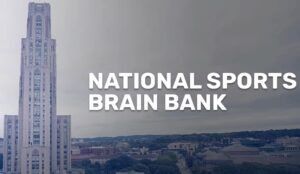 May 18 2023 The University of Pittsburgh announced the creation of the National Sports Brain Bank (NSBB) in order to study the neurological consequences associated with participating in an array of contact sports. UPMC Neurosurgeon, Dr. Joseph Maroon participated at the news conference that announce the establishment of the NSBB and discussed why it is so important.
May 18 2023 The University of Pittsburgh announced the creation of the National Sports Brain Bank (NSBB) in order to study the neurological consequences associated with participating in an array of contact sports. UPMC Neurosurgeon, Dr. Joseph Maroon participated at the news conference that announce the establishment of the NSBB and discussed why it is so important.
The NSBB will conduct long-term observational studies and serve as a brain donation registry for former professional and amateur athletes who participated in contact sports such as football, soccer, boxing, wrestling, ice hockey and may have experienced concussions or mild traumatic brain injury events during their careers. This exposure is known to be associated with an increased risk of cognitive and psychiatric syndromes later in life and the development of a neurodegenerative disease called Chronic Traumatic Encephalopathy (CTE).
See NSBB Press Conference video HERE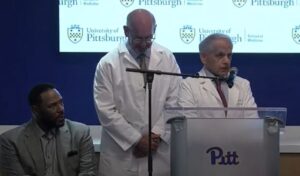
Goals of the NSBB
- Increase our knowledge of CTE, including its etiology, symptoms and frequency;
- Obtain provisional consent for brain donations before death
- There are not changes to the donor or family
- Share data and tissue samples with other researchers for further studies into CTE risk and resilience factors and molecular mechanisms of CTE.
- Collaborate with other neuropathologists to learn more about the histopathology and diagnostic criteria of CTE and other neurodegenerative processes following traumatic brain injury.
NSBB Seeks to remove Bias
Donors will be asked to agree to donate before death to allow cognitive and other tests to be completed. Other brain banks have not typically done this and otherwise relayed on the memory of relatives to provide a history about the donor’s symptoms. The National Sports Brain Bank aims to “reduce, eliminate, obviate that kind of bias.”
What is CTE?
- Chronic Traumatic Encephalopathy (CTE) is a neurodegenerative disorder associated with traumatic brain injuries that is diagnosed at death through Brain tissue changes.
- The characteristic pathology of CTE is an accumulation of abnormal tau protein deposits around blood vessels in the sulci (folds) of the cerebral cortex.
- Proposed Symptoms of CTE in Living people include cognitive impairment, memory loss and psychiatric disturbances.
- CTE has been reported in former athletes from a range of contact sports including rugby, soccer, American football, boxing and ice hockey, as well as in military veterans.
- The mechanism linking head impact and neurodegeneration is unknown.
Other Press Coverage of the NSBB Announcement
• The New York Times: An N.F.L. Doctor Wants to Know Why some Players Get C.T.E and Others Don’t
• Forbes: University of Pittsburgh Launches National Brain Bank
• Pittsburgh Post-Gazette: Jerome Bettis happy to be a star player for new National Sports Brain Bank at Pitt
• KDKA-TV: Jerome Bettis, Merril Hoge donating brains to University of Pittsburgh’s new National Sports Brain Bank
• WTAE-TV: Former Steelers to join brain research effort
• NBC Sports/Pro Football Talk: National Sports Brain Bank opens at University of Pittsburgh
• …Syndicated: Yahoo Sports
• WPXI-TV: Jerome Bettis, Merril Hoge pledge to donate brains for research at Pitt
• … Syndicated: Yahoo News
• Pittsburgh Tribune-Review: (second item) For the future
• KDKA-AM: Bettis, Hoge donating brains to National Brain Bank in Pittsburgh
• Steelers Now: Former Steelers Running Backs to Donate Brains for CTE Research
• Pittsburgh Business Times: Pitt unveils National Sports Brain Bank
• HealthDay: to post 5/19 – homepage here

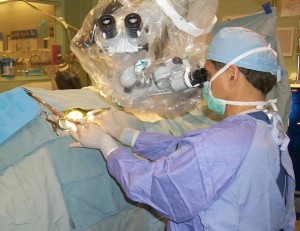
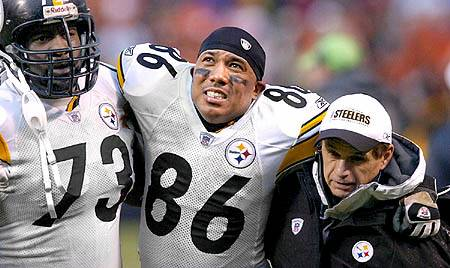
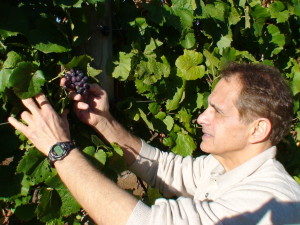
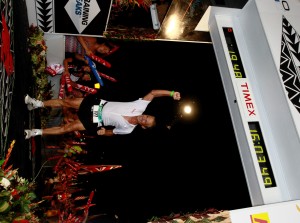 Dr. Maroon received an athletic scholarship to Indiana University in Bloomington, Indiana where as an undergraduate, he was named a Scholastic All-American in football. Dr. Maroon has successfully maintained his personal athletic interests through participation in 9 marathons and more than 72 Olympic-distance triathlon events. However, his greatest athletic accomplishment is his participation in 8 Ironman triathlons (Hawaii – 1993, 2003, 2008, 2010, 2013; Canada – 1995; New Zealand – 1997; Germany – 2000), where he usually finishes in the top 10 of his age group. Recently, in July 2012 and 2013, he finished second and third, respectively, in his age group in the Muncie, Indiana half Ironman triathlon. In October 2013 he completed his 5th World Championship Ironman in Kona, Hawaii.
Dr. Maroon received an athletic scholarship to Indiana University in Bloomington, Indiana where as an undergraduate, he was named a Scholastic All-American in football. Dr. Maroon has successfully maintained his personal athletic interests through participation in 9 marathons and more than 72 Olympic-distance triathlon events. However, his greatest athletic accomplishment is his participation in 8 Ironman triathlons (Hawaii – 1993, 2003, 2008, 2010, 2013; Canada – 1995; New Zealand – 1997; Germany – 2000), where he usually finishes in the top 10 of his age group. Recently, in July 2012 and 2013, he finished second and third, respectively, in his age group in the Muncie, Indiana half Ironman triathlon. In October 2013 he completed his 5th World Championship Ironman in Kona, Hawaii.